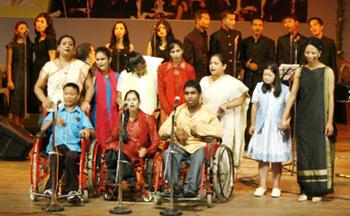Drawback lies with the administration when it fails to implement the country's law prepared by the House of Representatives. In that case the Non-Government Organizations (NGOs) have great responsibility to help the needy people getting justice and let them live a life with dignity. The NGOs have to play a major role in making a discrimination-free society. An example has been set up by a Guwahati-based NGO, namely Shishu Sarothi, by its Project Coordinator, Disability Law Unit-NE, Ms Anju Talukdar. The organization has successfully helped the persons with disabilities to get justice and their legal rights under the provisions of the Persons with Disabilities Act 1995.
One Nripendra Mahanta; has been working with the Life Insurance Corporation of India (LICI) since 1987. He was working as Assistant Branch Manager. He lost his vision about a year ago due to an illness. Learning to live with his disability was not his greatest problem. As the father of two minor children and sole earning member of his family, he had also to deal with the frightening prospect of having his right to livelihood denied to him. LIC had refused to allow him to continue working there. They also cancelled his promotion to the post of Branch Manager and stopped paying him his salary.
He approached the Disability Law Unit-NE of Shishu Sarothi which is dedicated to the cause of fighting for the rights of disabled. The Persons with Disabilities Act 1995 clearly states that 'no pubic sector or government employee acquiring disability during service can in any way be prejudiced. He can not be terminated from service, have his salary reduced or even have promotion denied to him'. Being a statutory corporation owned by the Government of India, LIC’s action was arbitrary and illegal. With the help of the Disability Law Unit-NE, Mahanta filed a writ petition in the Gauhati High Court.
Sometimes one does not have to wait for the court to pronounce judgment – the mere act of filing a case can provide relief. Within three months of filing of the case, the LIC informed Mahanta that he would be allowed to join work. Accordingly he joined the work again on 1st November 2007, but his case No.WPC 3669/07 continued, as LIC has not restored his promotion order, nor have they made any assurance on payment of arrear salary.
It may be mentioned in this context that Mahanta fell seriously ill in May 2004 and had to undergo major brain surgery for treatment of a tumor. The tumor was successfully treated but his eyesight was permanently affected as a result of the radiation therapy that he underwent. He tried to resume work in April 2006, but the authorities at LIC refused to allow him to join on account of his visual disability. He was told that in his line of work 'vision is a must' and he would not be allowed to resume duties until his vision was restored. His promotion order to the post of Branch Manager was also cancelled. He received full salary till October 2006 and half salary till April 2007 and no salary after May 2007.
Another similar case involving a government school teacher who had been kept out of work for over six years on acquiring serious disability, the Gauhati High Court directed that the petitioner be reinstated and paid all arrear salary.
Anju Talukdar regrets that the Persons with Disabilities Act do not provide this protection to employees in the private sector. As far as the private sector is concerned, the Act says that 'the government should ensure employment of disabled people by such ways as providing incentives to employers to ensure that at least five per cent of their work force is composed of persons with disabilities, as well as schemes for creating a barrier-free environment in places of employment.'
She further adds that the most frequent violators of the rights of persons with disabilities are the Government departments. From the matters ranging from admissions in educational institutions to reservations in government posts, the checking illegal dismissal from service, the Disability Law Unit-NE, with the help of public spirited lawyers, have often had to approach the courts for remedy. Anju suggests the persons with disability to approach the court in case of violations of their rights.
One Nripendra Mahanta; has been working with the Life Insurance Corporation of India (LICI) since 1987. He was working as Assistant Branch Manager. He lost his vision about a year ago due to an illness. Learning to live with his disability was not his greatest problem. As the father of two minor children and sole earning member of his family, he had also to deal with the frightening prospect of having his right to livelihood denied to him. LIC had refused to allow him to continue working there. They also cancelled his promotion to the post of Branch Manager and stopped paying him his salary.
He approached the Disability Law Unit-NE of Shishu Sarothi which is dedicated to the cause of fighting for the rights of disabled. The Persons with Disabilities Act 1995 clearly states that 'no pubic sector or government employee acquiring disability during service can in any way be prejudiced. He can not be terminated from service, have his salary reduced or even have promotion denied to him'. Being a statutory corporation owned by the Government of India, LIC’s action was arbitrary and illegal. With the help of the Disability Law Unit-NE, Mahanta filed a writ petition in the Gauhati High Court.
Sometimes one does not have to wait for the court to pronounce judgment – the mere act of filing a case can provide relief. Within three months of filing of the case, the LIC informed Mahanta that he would be allowed to join work. Accordingly he joined the work again on 1st November 2007, but his case No.WPC 3669/07 continued, as LIC has not restored his promotion order, nor have they made any assurance on payment of arrear salary.
It may be mentioned in this context that Mahanta fell seriously ill in May 2004 and had to undergo major brain surgery for treatment of a tumor. The tumor was successfully treated but his eyesight was permanently affected as a result of the radiation therapy that he underwent. He tried to resume work in April 2006, but the authorities at LIC refused to allow him to join on account of his visual disability. He was told that in his line of work 'vision is a must' and he would not be allowed to resume duties until his vision was restored. His promotion order to the post of Branch Manager was also cancelled. He received full salary till October 2006 and half salary till April 2007 and no salary after May 2007.
Another similar case involving a government school teacher who had been kept out of work for over six years on acquiring serious disability, the Gauhati High Court directed that the petitioner be reinstated and paid all arrear salary.
Anju Talukdar regrets that the Persons with Disabilities Act do not provide this protection to employees in the private sector. As far as the private sector is concerned, the Act says that 'the government should ensure employment of disabled people by such ways as providing incentives to employers to ensure that at least five per cent of their work force is composed of persons with disabilities, as well as schemes for creating a barrier-free environment in places of employment.'
She further adds that the most frequent violators of the rights of persons with disabilities are the Government departments. From the matters ranging from admissions in educational institutions to reservations in government posts, the checking illegal dismissal from service, the Disability Law Unit-NE, with the help of public spirited lawyers, have often had to approach the courts for remedy. Anju suggests the persons with disability to approach the court in case of violations of their rights.
- 10016 reads









Add new comment